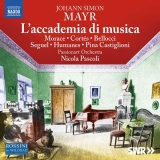Johann Simon Mayrs Farce L’accademia di musica wurde 1799 im Teatro San Samuele in Venedig uraufgeführt. Die Geschichte ist klassisch: Der wohlhabende Guglielmo ist mit seinem Sohn Valerio zerstritten und möchte sein Dienstmädchen Vespina heiraten, das allerdings in den Diener Cecchino verliebt ist. Valerio seinerseits hat sich in die schöne Venezianerin Annetta verliebt, die einen Plan hat, laut dem Valerio wieder von seinem Vater aufgenommen werden und sie gleichzeitig zur Frau nehmen könnte.
Die 2019 beim Festival Rossini in Wildbad aufgenommene Produktion ist von gutem Niveau. Bassbariton Filippo Morace überzeugt als Guglielmo stimmlich und auch darstellerisch, in dem er den lüsternen Charakter des alten Mannes voll ausspielt.
Tenor César Cortés (Valerio) fehlt es etwas an natürlicher Frische, während Filippo Pina Castiglioni mit schlanker und kräftiger Tenorstimme in der Doppelrolle Momoletto und Marfisa besser gefällt. Ein Highlight ist sein Auftritt als alte Marfisa, für den er eine karikierende Kopfstimme benutzt. Ricardo Seguel gestaltet die Buffo-Partie des Cecchino mit überbordendem Spielwitz.
Maria del Mar Humanes ist eine entzückende Dienerin Vespasia und Eleonora Bellocci brilliert mit kräftigem Sopran als Annetta.
Der Dirigent Nicola Pascoli inspiriert das Passionart Orchestra zu einem lebendigen und kraftvollen Spiel. Und so kann man diese Weltersteinspielung rundum als gelungen bezeichnen.
Johann Simon Mayr’s farce L’accademia di musica was first performed in 1799 at the Teatro San Samuele in Venice. The story is classic: the wealthy Guglielmo is at odds with his son Valerio and wants to marry his maid Vespina, who, however, is in love with the servant Cecchino. For his part, Valerio has fallen in love with the beautiful Venetian Annetta, who has a plan according to which Valerio could be taken back by his father and take her as his wife at the same time.
Recorded in 2019 at the Rossini Festival in Wildbad, the production is of a good standard. Bass-baritone Filippo Morace is convincing as Guglielmo. With a good voice he fully plays out the old man’s lecherous character.
Tenor César Cortés (Valerio) lacks a bit of natural freshness, while Filippo Pina Castiglioni, with a slender and strong tenor voice, is more pleasing in the double role of Momoletto and Marfisa. A highlight is his performance as old Marfisa, for which he uses a caricatured head voice. Ricardo Seguel shapes the buffo part of Cecchino with exuberant wit.
Maria del Mar Humanes is a delightful servant Vespasia and Eleonora Bellocci shines with powerful soprano as Annetta.
Conductor Nicola Pascoli inspires the Passionart Orchestra to lively and powerful playing. And so this world premiere recording can be called successful all around.






















